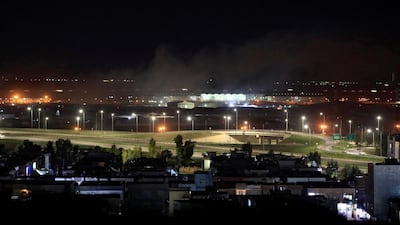As news emerged on Monday night of a rocket attack in Erbil, aimed at the city's airport and a base housing American soldiers, all eyes were on Washington.
This is Joe Biden’s first real test in Iraq since becoming president less than a month ago. How he handles this incident will set the tone for how he is seen not only in Iraq, but in the region.
Statements of condemnation and phone calls with officials will be read as a timid response to militias supported by Iran. The motivation for inaction, rightly or wrongly, will be perceived as the Biden administration prioritising a diplomatic agreement with Iran about its nuclear file, over the security and stability of the region.
The Iraqi President Barham Salih made a point of describing the attack as a “terrorist attack”, showing the seriousness of the incident. He said in a tweet that “targeting Erbil represents a dangerous escalation and terrorist, criminal attack”, adding “It is a state and sovereignty battle against terrorism and outlaws”.
It is indicative of the strange era we live in, as the nationality of the contractor tragically killed in the attack will likely influence the outcome. Reports that there was one civilian contractor killed, with six others wounded, including a US service member, were followed with questions about the nationality of the contractor. If he or she were American, expectations of a tougher US response would be heightened. The killing of an Iraqi-American contractor in December 2019 led to former US president Donald Trump authorising a strike to assassinate the head of the IRGC's Quds Force, Qassem Suleimani, and the effective head of the Popular Mobilisation Forces, Abu Mahdi Al Muhandis, in January 2020.
Regardless of the nationality of the contractor killed on Monday night, the response should be swift and stern, including arrests and attacks on unlawful bases of militias targeting Iraqi state entities such as military bases and airports.
Security sources confirm that the rockets were fired from within the Kurdistan region of Iraq. Prior to 2014, few Iran-backed militias were in northern Iraq let alone in the Kurdistan region. However, after joining the counter-ISIS coalition, several militias stayed on and set up illegal bases. Their continued presence in northern Iraq, some within the Kurdistan region border and others in Mosul, antagonises civilians and Iraqi security forces. This should be a moment to support the Iraqi army and police, and to end the presence of militias outside of military bases controlled by the Iraqi military.
Monday’s attack cannot have come as a surprise to American officials, certainly not to US Secretary of Defence Lloyd Austin who was stationed in Iraq for a number of years. As commander of Centcom, he would be well-versed in how militia groups work in Iraq. So, an American response cannot be overly delayed, as it will be read in Baghdad, Tehran and the wider region as a hesitation that gives the militias and their Iranian backers the upper hand. The developments in Iraq come as the Houthis in Yemen, also supported by Iran, escalate their attacks on Saudi Arabia to a level unseen for years. Non-state actors, just like diplomats and officials in the region, are sizing up this administration and following its every move.
US Secretary of State Anthony Blinken issued a statement hours after the attack saying “we are outraged”. No official should act out of rage, but that expression of outrage should be translated into serious action, including taking action against elements deemed as “terrorists and outlaws” by the head of state of Iraq himself.
Mina Al-Oraibi is editor-in-chief of The National


